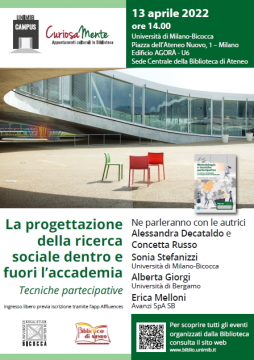
The volume “Methodology and participatory techniques. Social research in times of complexities” (Pearson 2022) by Alessandra Decataldo and Concetta Russo will be presented on Wednesday, April 13 at 14.00 at University Central Library (building U6, Piazza dell’Ateneo Nuovo,1 Milano).
The authors will discuss the core topics of the book together with Alberta Giorgi, university professor, and creative methodology expert; they will also discuss the practical implications of the volume- social research design applied to extra academic settings with Erica Melloni, an expert in design and evaluation.
The encounter is for the entire academic community and for all those needing to face the necessity of designing a collaborative and/or participative method. Starting from the European Comunity guidelines “Horizon 2020”, has been asked by funding bodies, both national and international to create social research projects.
Sonia Stefanizzi, Chief director of the Sociology and Social Research Department will introduce the encounter.
Brief profile of the event protagonists
Alessandra Decataldo is an associate professor in the Sociology and Social Research Department. She teaches Social Research Methodology and is a member of the Ph.D. in Analysis of Social and Economic Processes (ASEP) faculty board, She is also a member of the Italian Sociology Association Directive.
Concetta Russo is a Ph.D. in Anthropology and researcher at the Sociology and Social Research Department. She has done ethnographic research in Cuba, Australia, and Italy in the working insecurities field and is interested in visual research.
Alberta Giorgi is a researcher in Cultural and Communicative Processes Sociology at the University of Bergamo. She is the co-founder of CRE.ME (Creative Methods Open Lab). Her research deals with the intersections between politics, genre, and religion. Her latest publication with M. Pizzolati and E. Vacchelli is Metodi Creativi per la Ricerca Sociale (il Mulino 2021).
Erica Melloni deals with the analysis and evaluation of politics and organizations for the public, private and third sector fields where she performs research, counseling, and formation. She is also responsible for the activity and evaluation of Avanzi SpA SB, adjunct professor of Public Policies at the University of Milano-Bicocca and a member of the OIV, MEF, and the Evaluation Unit of the University Napoli.
Enroll in the event
To take part inn the event, use the app Affluences: look for “Università Bicocca. Biblioteca di Ateneo – CuriosaMente”click on Prenota and on Prossima fascia oraria disponibile.
Based on the art. 10 of the rectoral decree, all the participants must have the reinforced Green Pass for Covid -19 and wear the FFP2 mask.
Ahlin, T., Li, F., “From field sites to field events: Creating the field with information and communication technologies (ICTs)”, in Medicine Anthropology Theory, 6 (2), pp. 1-24, 2019.
Arribas Lozano, A., “Reframing the public sociology debate: Towards col- laborative and decolonial praxis”, in Current Sociology, 66 (1), pp. 92-109, 2018.
Arribas Lozano, A., “Knowledge in Motion. Reciprocity, Co-Presence, Collective Analysis and Shared Authority in Research”, in Revista de Antropología Iberoamericana, 15 (2), pp. 331-356, 2020.
Behar, R., The Vulnerable Observer: Anthropology That Breaks Your Heart, Boston, Beacon Press, 1996.
Bhattacharya, H., “New critical collaborative ethnography”, in S.N. Hesse-Biber, P. Leavy (a cura di), Handbook of Emergent Methods, New York, Guilford Press, pp. 303-322, 2008.
Burawoy, M., “For Public Sociology”, in American Sociological Review, 70 (1), pp. 4-28, 2005.
Deeb, H.N., Marcus, G.E., “In the Green Room: An Experiment in Ethnographic Method at the WTO”, in PoLAR: Political and Legal Anthropology Review, 34 (19), pp. 51-76, 2011.
Faccioli, P., Losacco, G., Manuale di sociologia visuale, Milano, Franco Angeli, 2003.
Fine, M., Torre, M.E., Frost, D., Cabana, A., Avory, S., “Refusing to check the box”, in K. Gallagher (a cura di), The Methodological Dilemma Revisited: Creative, Critical and Collaborative Approaches to Qualitative Research for a New Era, Oxon, Routledge, pp. 11-31, 2018.
Harper, D., Visual Sociology, London, Routledge, 2012.
Hine, C., “Internet Research as Emergent Practice”, in S.N. Hesse-Biber, P. Leavy (a cura di), Handbook of Emergent Methods, New York, Guilford Press, pp. 303-322, 2008.
Hine, C., Ethnography for the Internet: Embedded, Embodied and Everyday, London, Bloomsbury, 2015.
Holmes, D., Marcus G.E., “Collaboration Today and the Re-imagination of the Classic Scene of Fieldwork Encounter”, in Collaborative Anthropologies, 1, pp. 81-101, 2008.
Iedema, R., Carroll, K., “The ‘clinalyst’: Institutionalizing reflexive space to realize safety and flexible systematization in health care”, in Journal of Organizational Change Management, 24, pp. 175-190, 2011.
Iedema, R., Mesman, J., Carroll, K., Visualising Health Care Practice Improvement: Innovation from Within, London, Radcliffe Publishing, 2013.
Lassiter, L.E., The Chicago Guide to Collaborative Ethnography, Chicago, University of Chicago Press, 2005.
Madianou, M., Miller, D., Migration and New Media: Transnational Families and Polymedia, London, Routledge, 2012.
Marcus, G.E., Para-sites: A Casebook Against Cynical Reason, Chicago, University of Chicago Press, 2000.
Popper, K., Logik der Forschung. Zur Erkenntnistheorie der modernen Naturwissenschaft, Wien, Springer-Verlag, 1934 (trad. it. Logica della scoperta scientifica. Il carattere autocorrettivo della scienza, Torino, Einaudi, 1970).
Ranocchiari, D., Giorgianni, E., “Doing Ethnographically Grounded Music Videos”, in Visual Ethnography, 9 (1), pp. 8-18, 2020.
Rappaport, J., “Beyond participant observation: Collaborative ethnography as theoretical innovation”, in Collaborative Anthropologies, 1 (1), pp. 1-31, 2008.
Robinson, L., e Schulz, J., “New fieldsites, new methods: new ethnographic opportunities”, in W. Chapter (a cura di), The Handbook of Emergent Technologies in Social Research, Oxford, Oxford University Press, pp. 180-198, 2011.
Vargiu, A., “Le diversità nella ricerca-azione partecipata: alcune implicazioni metodologiche e procedurali”, in Studi di Sociologia, 46 (2), pp. 205-232, 2008.
